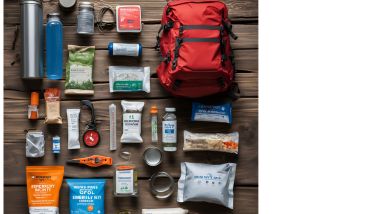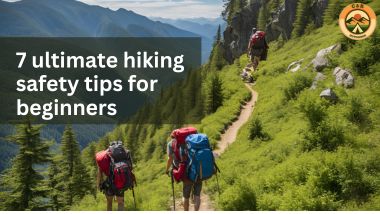If you’re new to hiking, safety should always be your top priority. Knowing how to prepare for your first hike can make the difference between an enjoyable adventure and a stressful, potentially dangerous one.
So, what are the most important hiking safety tips for beginners? Let’s dive into the seven ultimate tips to ensure your first hike is both safe and enjoyable.
1. Plan Your Route Carefully
The first step to a safe hiking trip is planning your route in advance. As a beginner, you don’t want to jump into challenging hikes without understanding the terrain and conditions.
Research the Trail: Before setting out, research the trail’s difficulty level, total distance, and elevation gain. Choose trails that match your fitness level and experience. Look for beginner-friendly hikes that are well-marked.
Check Weather Conditions: Weather can change quickly in outdoor environments, so always spend time to check the forecast. Extreme weather like thunderstorms, heavy rains, or intense heat can turn a peaceful hike into a risky adventure. If the weather looks bad, reschedule your hike to avoid possible hiker injures during your adventure.
Download Offline Maps: Cell service may be unreliable in remote areas, so download a GPS map or use an offline app like AllTrails. That way, if you get lost or turned around, you’ll have a backup plan to leave.
2. Wear the Right Gear

Your comfort and safety on a hike are directly tied to the gear you bring along. When it comes to hiking, dressing properly can prevent blisters, keep you warm or cool, and even protect you from injuries.
Proper Footwear: One of the most important hiking safety tips for beginners is to invest in a good pair of hiking boots. Make sure they have good ankle support and are waterproof or water-resistant, depending on the conditions.
Dress in Layers: Weather can be unpredictable, especially at higher elevations. The best hiking safety tips for beginners is by dressing in layers allows you to adjust to changing conditions. Choose moisture-wicking clothes that dry quickly, and pack a lightweight waterproof jacket in case of rain.
Safety Equipment: Even on short hikes, bring essential safety gear like a first-aid kit, whistle, and a multi-tool for treating injures. These small items can be lifesavers in unexpected situations.
3. Stay Hydrated and Pack Snacks

Dehydration and hunger can sneak up on you during a hike, particularly if you’re not used to outdoor activities. Staying hydrated and fueled is crucial for maintaining energy and focus.
Bring Enough Water: Always carry enough water for the entire hike. A good rule of thumb is to bring at least one liter of water for every two hours of hiking, more if it’s a hot day. Consider bringing a water filtration device if you’re hiking near water sources and ensure you drink plenty of water.
High-Energy Snacks: Pack lightweight, nutrient-dense snacks like energy bars, nuts, and dried fruit. These will keep your energy levels up without weighing down your pack.
4. Tell Someone Your Plan

One of the simplest but most effective hiking safety tips for beginners is to let someone know your plans before you head out. If anything goes wrong, it’s important that someone knows where you are.
Share Your Itinerary: Let a friend or family member know your route, estimated time of return, and any backup plans. This can be a crucial step in case of an emergency.
- Carry Identification: Always have an ID and emergency contact information on you while hiking. It’s also a good idea to carry a small note with any relevant medical conditions, just in case for rescue purposes.
5. Know Your Limits
It’s tempting to push yourself, especially when you see an amazing view or the trail seems to be just a little longer. However, as a beginner, it’s important to know how soon to stop.
- Pace Yourself: Start slow and gradually build your endurance. Don’t try to tackle a hike that’s too far beyond your physical capabilities.
- Turn Back If Necessary: If you start to feel overly fatigued or if the weather takes a sudden turn for the worse, don’t hesitate to turn back to your place of rest. Pushing through when you’re tired or in poor conditions is one of the most common mistakes beginners make.
6. Stay on the Marked Trail
For beginners, sticking to the designated trail is one of the most important hiking safety tips. Trails are marked for a reason—they keep you from getting lost and help preserve the natural environment.
- Follow Trail Signs and Markers: Pay attention to signs and trail markers to avoid losing your way. If you’re in an unfamiliar area, constantly check your map to make sure you’re on track.
- Avoid Cutting Through Undesignated Areas: Going off-trail can damage the environment and put you at risk of getting lost or injured. Stick to the path to ensure a safe and enjoyable hike.
7. Be Prepared for Emergencies

Even on a beginner’s hike, it’s important to be prepared for emergencies. With a few essential items and some basic knowledge, you’ll be ready to handle any unexpected situation.
- Basic First-Aid Skills: It’s always a good idea to learn basic first-aid before heading out on a hike. A minor injury like a scrape or twisted ankle can be easily treated with the right knowledge.
- Carry a Fully Charged Phone: Bring your cell phone fully charged and consider packing a portable charger. Your phone can serve as a GPS device or help you call for assistance in an emergency.
- Pack an Emergency Blanket or Shelter: In case the weather changes unexpectedly, pack a lightweight emergency blanket or a small shelter. It’s better to have it and not need it than to be caught unprepared.
Conclusion
By following these hiking safety tips for beginners, you can ensure a safer and more enjoyable outdoor experience. Remember, preparation is key—when you’re ready for anything, you can fully enjoy the beauty of nature.
So, lace up those hiking boots, pack your bag, and get ready to hit the trails! What’s your next hiking destination? Let us know in the comments!
